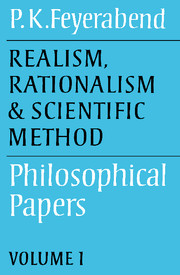Book contents
- Frontmatter
- Contents
- Introduction to volumes 1 and 2
- PART I ON THE INTERPRETATION OF SCIENTIFIC THEORIES
- PART 2 APPLICATIONS AND CRITICISMS
- 8 Introduction: proliferation and realism as methodological principles
- 9 Linguistic arguments and scientific method
- 10 Materialism and the mind–body problem
- 11 Realism and instrumentalism
- 12 A note on the problem of induction
- 13 On the quantum theory of measurement
- 14 Professor Bohm's philosophy of nature
- 15 Reichenbach's interpretation of quantum mechanics
- 16 Niels Bohr's world view
- 17 Hidden variables and the argument of Einstein, Podolsky and Rosen
- Sources
- Name index
- Subject index
15 - Reichenbach's interpretation of quantum mechanics
Published online by Cambridge University Press: 05 June 2012
- Frontmatter
- Contents
- Introduction to volumes 1 and 2
- PART I ON THE INTERPRETATION OF SCIENTIFIC THEORIES
- PART 2 APPLICATIONS AND CRITICISMS
- 8 Introduction: proliferation and realism as methodological principles
- 9 Linguistic arguments and scientific method
- 10 Materialism and the mind–body problem
- 11 Realism and instrumentalism
- 12 A note on the problem of induction
- 13 On the quantum theory of measurement
- 14 Professor Bohm's philosophy of nature
- 15 Reichenbach's interpretation of quantum mechanics
- 16 Niels Bohr's world view
- 17 Hidden variables and the argument of Einstein, Podolsky and Rosen
- Sources
- Name index
- Subject index
Summary
In section 3 of his paper ‘Three-valued logic’, Hilary Putnam deals with Reichenbach's attempt to interpret quantum mechanics on the basis of three-valued logic, and he uses some arguments of his own in order to show that this attempt is ‘a move in the direction of simplifying the whole system of laws’ (171). I believe that the Reichenbach–Putnam procedure cannot be defended and that it leads to undesirable consequences. There are the reasons for my belief:
THREE-VALUED LOGIC AND CONTACT-ACTION
Putnam asserts (a) that ‘the laws of quantum mechanics … are logically incompatible with’ the principle of contact-action ‘if ordinary two-valued logic is used’; and (b) that ‘adopting a three-valued logic permits one to preserve both the laws of quantum mechanics and the principle that no causal signal travels with infinite speed’. Assuming for a moment that (a) and (b) give a correct statement of Reichenbach's position (which they do not – see section 3) and that (a) is true we can at once say that adopting the procedure suggested in (b) would violate one of the most fundamental principles of scientific methodology, namely, the principle to take refutations seriously. The statement that there is no velocity greater than the velocity of light is a well-corroborated statement of physics. If, as is asserted in (a), quantum mechanics implies the negation of that statement, we should consider it as refuted and look for a better theory. This is what has in fact happened.
- Type
- Chapter
- Information
- Realism, Rationalism and Scientific MethodPhilosophical Papers, pp. 236 - 246Publisher: Cambridge University PressPrint publication year: 1981
- 1
- Cited by



